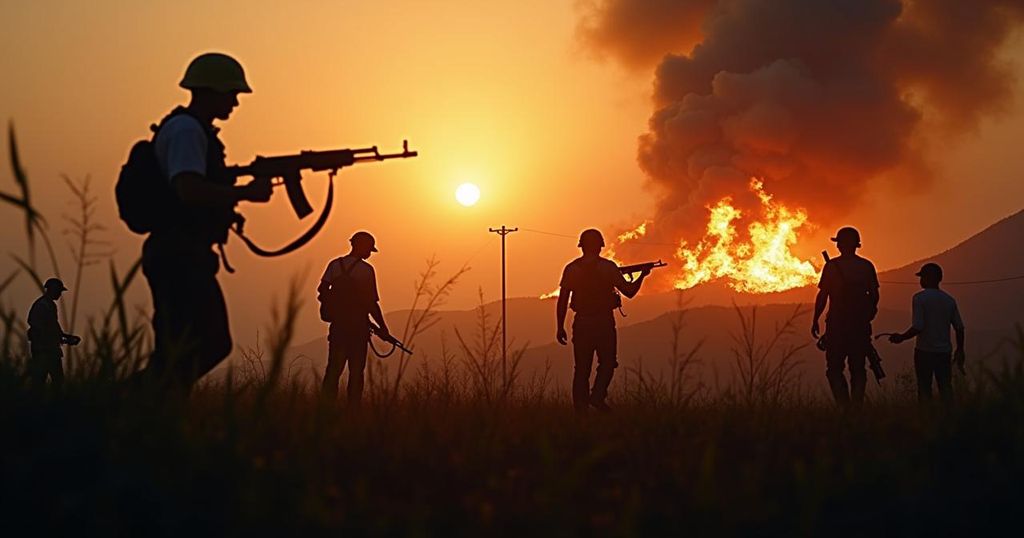Six Migrants Dead After Mexican Soldiers Open Fire on Truck Near Guatemalan Border

On October 3, 2024, six migrants from Egypt, Peru, and Honduras were killed when Mexican soldiers opened fire on their truck near the Guatemalan border. This incident has prompted investigations into the soldiers’ actions, while raising critical concerns about the treatment of migrants within Mexico. The event has drawn international attention, particularly from the Peruvian government, demanding accountability and a thorough investigation into the circumstances surrounding the tragedy.
On October 3, 2024, six migrants hailing from Egypt, Peru, and Honduras tragically lost their lives near the Guatemalan border when Mexican army troops opened fire on a truck carrying them. This incident occurred amid rising tensions surrounding the treatment of migrants in the region. Among the deceased, three were identified as Egyptians, one as a Peruvian, and one as a Honduran, with one individual yet to be identified. The situation escalated when ten other migrants sustained injuries during the incident, although the conditions of these individuals remain uncertain. Following the incident, Mexican President Claudia Sheinbaum described the shootings as “deplorable” and emphasized the necessity of urgent investigations into the actions of the soldiers involved. Two soldiers have been transferred to civilian prosecutors for questioning, but no formal charges have been made thus far. The event marks a significant recurrence of violence against migrants by authorities, reminiscent of a 2021 incident where police in Tamaulipas killed 17 migrants. Peru’s Foreign Ministry has confirmed the death of a Peruvian citizen and has demanded a thorough investigation into the incident. The Defense Department indicated that there were claims from the soldiers about having come under fire from the migrant convoy, which authorities later attributed to the apparent refusal of the trucks to comply with orders to stop. Irineo Mujica, a migrant rights activist, expressed skepticism regarding the claims of gunfire from the migrants, suggesting it is implausible that the individuals would fire upon the military. The Mexican Council of Bishops condemned the actions resulting in the deaths, labeling the response as a “disproportionate use of lethal force”. This incident not only brings to light the ongoing issues faced by migrants in Mexico but also underscores the problematic relationship between military actions and civil rights in a country previously experiencing significant issues related to drug cartel violence and human rights violations surrounding migrant treatment.
The treatment of migrants within Mexico has become a contentious issue, particularly given the rising influence of drug cartels and the dangerous routes that many individuals take while seeking asylum or better opportunities. Many migrants traverse this perilous journey through Mexico to reach the United States, often placing their lives in the hands of smugglers, leading to repeated instances of violence and discrimination. Recent years have seen multiple incidents where law enforcement officials, including the military, have engaged in violent confrontations with migrant groups, resulting in fatalities and severe injuries, igniting outrage among human rights organizations and governments alike. The current political climate under President Claudia Sheinbaum reflects a critical moment for reform in how authorities address migrant safety and human rights, especially in light of heightened scrutiny following deadly incidents by security forces.
The recent shooting incident resulting in the deaths of six migrants near the Guatemalan border highlights the ongoing crisis surrounding the treatment of migrants in Mexico. It raises crucial questions about military protocol, accountability, and the broader implications of reinforcing military power in regions fraught with human rights concerns. As investigations proceed, there is an urgent call for comprehensive reform in policy and practice to prevent such tragedies from occurring in the future. The necessity for heightened accountability and transparency among military and law enforcement personnel is more pressing than ever, as the region navigates its complex relationship with both migration and security.
Original Source: apnews.com







